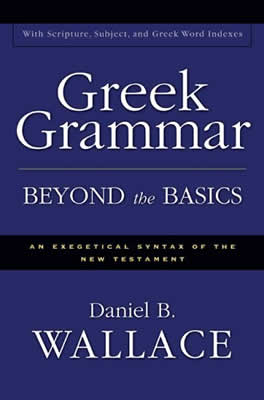NEW TESTAMENT Greek Grammar Beyond the Basics: Exegetical Syntax of the New Testament by Daniel B. Wallace (Grand Rapids, Michigan: Zondervan 1996). This is the finest of Zondervan’s excellent collection of New Testament Greek study aids, and would be a very useful addition to the library of any busy Bible teacher who wished to continue studying and using the New Testament in its original language. Although the book is relatively large compared to its main competitors (the 'Idioms' of Moule or Porter), its flexibility, layout, ease of use, and comprehensiveness make it much more user-friendly. There are in fact three different and clearly labeled levels of discussion going on in the text at the same time, so that a beginner with only a year of Greek can use and understand it while a seasoned pastor who “lives in the Greek text” will also be stimulated and helped. For example, in the main body of the text Wallace takes time to carefully and clearly define the different uses of the genitive with several examples of each from the New Testament, while in the footnotes he interacts with other Greek grammarians, journal articles, unpublished dissertations, textual critics, and commentators. This feat of presentational brilliance ensures that the book can be used time and time again by exegetes of varying abilities, either as a graded reader in intermediate Greek syntax or as a reference work. An abridged version of the book, entitled The Basics of New Testament Syntax should be available soon, but although this will be cheaper (c. £20) and shorter (352 pages) it will be less useful for those who intend to make use of the book’s more advanced features as they progress in their knowledge of Greek. The jewel in the crown is Wallace’s use of literally hundreds of examples and illustrations throughout the book. These are taken from every book in the New Testament, given in Greek and English with the relevant word or phrase highlighted, and often followed by further comment or explanation. Exegetically significant or debatable examples of the use of certain constructions are labeled as such and given extended treatments. These very useful discussions can be accessed in three ways, either via discussion of the relevant syntactical category, or via the Greek word, or via the verse of Scripture. For example, studying Galatians 2:16 in Greek, you come across dia pisteos Iesou Cristou and wish to understand this unexpected construction. You can either turn to Galatians 2:16 in the Scripture Index (noting that the page number of the major discussion of the verse is in bold), or turn to Pistis Cristou in the Greek Word Index, or turn to the section on the subjective genitive. Either way, you end up at pages 114-116 with a discussion of the options for translating or exegeting the verse and (if you want them) ten footnotes interacting with and referring to more detailed studies. Reference use is even more enhanced for the computer literate who can buy a CD version of Greek Grammar Beyond the Basics via the www.bible.org website. [There is also now a version of the book linked to Bible references in the excellent software program 'Bibleworks'.] I found Wallace’s discussion of the verbal aspect debate (pp. 504-512) to be quite stimulating, although by no means exhaustive. On some of the “debatable examples” I profoundly disagreed with his conclusions. Occasionally one can glimpse his theological position (see the perhaps excessive discussion of the substitutionary use of 'hyper') although he is normally careful to avoid scoring points (after making a very convincing grammatical case against the deponent view of pausontai in 1 Corinthians 13:8 he is, as a self-confessed cessationist, very restrained). The book even contains a few jokes (see Nominative ad Nauseum, and the quotation from Douglas Adams on page 495) - which I imagine must be a first for a Greek grammar? This review was first published in Churchman 114/4 (2000). |
